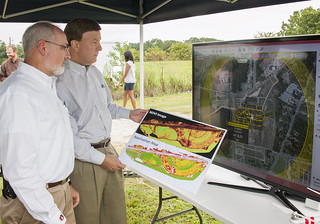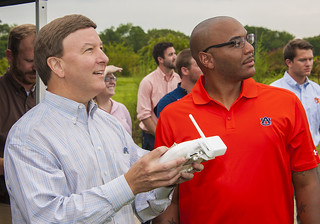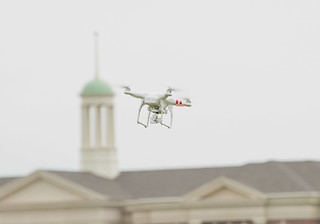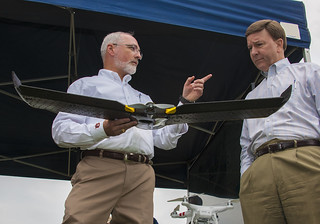Auburn University enhancing commerce and research through unmanned aircraft systems
Article body
Unmanned aircraft systems, or drones, are more than a passing hobby—Auburn University officials believe they could be a key component in the nation's commerce and research.
U.S. Rep. Mike Rogers recently received a firsthand look at the potential when Auburn University Aviation Center officials demonstrated rotary-wing and fixed-wing unmanned aircraft, showing how they can be used in business and industry, as well as in research areas such as engineering, building science and agriculture.
"Auburn leads the nation in UAS technology, and I'm excited by the opportunities it will create for both Alabama and the nation," Rogers said.
Earlier this year Auburn received the nation's first FAA approval to operate a new Unmanned Aircraft Systems Flight School as part of its Aviation Center. The FAA approval requires that operators of unmanned aircraft pass a written exam and a flying test, both of which Auburn will administer through its flight school.
"The potential is immense," said Bill Hutto, Aviation Center director. "Unmanned aircraft systems can safely and efficiently inspect bridges and construction projects, conduct search-and-rescue operations and play a key role in precision agriculture."
In agriculture, unmanned aircraft systems equipped with sensors, such as infrared cameras, can quickly and easily monitor the health of crops and work in conjunction with GPS-guided ground equipment that can deliver resources—water, pesticides and fertilizer—precisely where they are needed.
"Precision agriculture techniques can save time and money and increase yields and profits for agribusiness," said Steve Taylor, head of Auburn's Department of Biosystems Engineering. "These tools will have a major impact in many areas, not only for agricultural crops but also for better management of our forests."
Auburn will conduct UAS flight training on campus and around the state for Auburn students and faculty, members of public agencies and the general public. Hands-on training covers basic flight maneuvers through obstacle courses, while classroom work covers the proper uses for unmanned aircraft, FAA rules and regulations and how to pursue FAA approval to fly commercially. The first class is tentatively set to begin later this month at Auburn.
The university has been involved in aviation education for more than 80 years and has been providing fight training for pilots for nearly 75 years. Auburn offers three aviation/aerospace degrees: aviation management, professional flight management and aerospace engineering.
More information is available on the Auburn University Aviation Center website at http://www.auburn.edu/aviationcenter.
Related Media
Media interested in this story can contact Communications Director Preston Sparks at (334) 844-9999 or preston.sparks@auburn.edu.
Auburn University is a nationally ranked land grant institution recognized for its commitment to world-class scholarship, interdisciplinary research with an elite, top-tier Carnegie R1 classification, life-changing outreach with Carnegie’s Community Engagement designation and an undergraduate education experience second to none. Auburn is home to more than 30,000 students, and its faculty and research partners collaborate to develop and deliver meaningful scholarship, science and technology-based advancements that meet pressing regional, national and global needs. Auburn’s commitment to active student engagement, professional success and public/private partnership drives a growing reputation for outreach and extension that delivers broad economic, health and societal impact.








